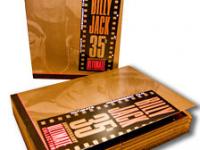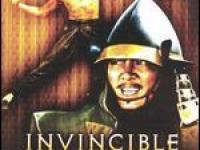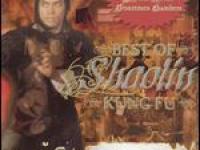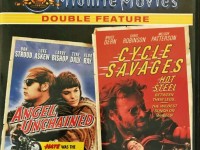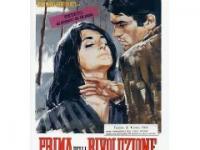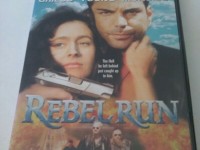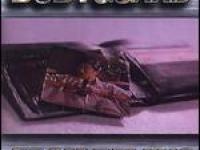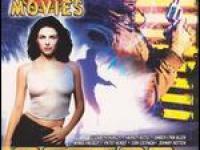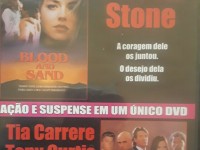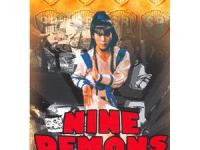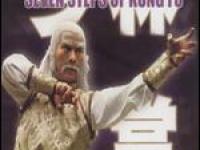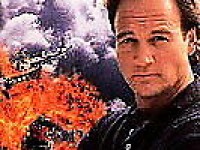Movie Description
A hired killer accidentally blinds a beautiful nightclub singer during what was supposed to be his last murder. When he falls in love with her and accepts another contract in order to finance her cornea surgery, the stage is set for a long and bloody confrontation. A boisterous bullet opera from Woo, tempered as usual with his fascination with the notion of the honorable killer and with the doubling of similar men whom circumstances have placed on opposite sides of the law. Very heavy on the Catholic imagery and redemption motifs.
Credits
Cast: Chow Yun Fat
Director: John Woo
Producer: Hark Tsui
Synopsis
When Jeffrey, a hit man, accidentally blinds a young nightclub chanteuse, his guilt makes him leave the racket to take care of her. Falling in love with the vulnerable singer, he eventually agrees to do one last hit to raise the money needed for a cornea transplant that might restore her vision. His assignment is to assassinate mob leader Tony Weng during the crowded Dragon Boat Festival. The hit is successful, despite all the police protection, and he almost gets away. But a child is injured during his escape, and Jeffrey nearly gets caught while taking the time to drive her to a nearby hospital for medical attention. Because his identity was revealed while saving the child, the new crime boss now wants him killed. Refusing to pay him for the successful hit, he puts a contract out on his life instead.
Film Notes
DVD Features:
Region 1 Encoding
Keep Case
CRITERION COLLECTION
Special Features: Includes deleted scenes, the theatrical trailer, and audio commentary by John Woo and Terence Chang.
Shot in Hong Kong.
Shown at the Cannes Film Festival May 12, 1989.
Director John Woo edited several sequences in "The Killer" himself, including the dragon-boat chase.
There is a 130 minute version of "The Killer" available on video in Taiwan. Fox Lorber was not offered the domestic video rights to this longer version.
John Woo was born in Canton, China in 1946, but by 1950, he and his family had already moved to Hong Kong. While still a young man, Woo started making short, mostly experimental, films in 16mm and 8mm; he has described these early efforts as primarily "existential love stories". In 1969, Woo, having bypassed film school for financial reasons, began working at the Cathay Film Company in Hong Kong as a script supervisor. At the studio, he met his first mentor, martial arts specialist Zhang Cheh, who he worked for as an assistant director.
By 1973 Woo had his first directing credit (as co-director) on "The Young Dragons". Because of its excessive violence the film was eventually banned in Hong Kong, but it showed enough promise to get him a three year deal from Golden Harvest. Woo's initial work for the studio was a series of low budget kung fu movies, mostly shot in Korea. In 1975, while still the studio's youngest director, he made a Cantonese opera film ("Princess Chang Ping") that proved to be very successful financially, and he followed that up with several comedies. According to Woo, the 1977 comedy "Money Crazy" (aka "The Pilferer's Progress") made his reputation in the Hong Kong film industry; it was a runaway hit. During this prolific period of his career (17 films from 1973-1981), Woo gave several future Hong Kong stars their first acting roles, including Jackie Chan and Samo Hung (who started out as stuntmen for Woo), and comedian Michael Hui.
Woo left Golden Harvest in 1981 for the new studio Cinema City, and what he thought would be more creative freedom. Unfortunately, the studio only wanted him to make comedies, in hope of repeating his "Money Crazy" success. In what Woo describes as "one of the worst times of my life", he spent two years directing a pair of films in Taiwan that he is still unhappy with. When he returned to Hong Kong, his ties to Cinema City severed, Woo accepted a job at the Film Workshop -- an independent production company founded by his friend, producer/director Tsui Hark (another HK filmmaker given his start by Woo). The two collaborated on "A Better Tomorrow" (1986), with Hark producing and Woo writing and directing. This film was a resounding critical success and became the highest grossing picture in Hong Kong history.
Suddenly, Woo was Asia's top action director. And he followed the triumph of "A Better Tomorrow" with a slew of successful action films in the late '80s/early '90s: "The Killer" (1989; which made his reputation in the West), "Bullet in the Head" (1990), "Once a Thief" (1991), and "Hard-Boiled" (1992), most starring Hong Kong megastar Chow Yun-fat. Woo made his American directorial debut in 1993 with the Jean-Claude Van Damme action vehicle, "Hard Target".
John Woo on "The Killer":
"'The Killer' was my idea. Jean-Pierre Melville influenced me a lot, and I always wanted to make a film like 'Le Samourai' [1967].... I also wanted to stress that justice is a universal value, shared by people who lead completely different lives. My killer is not very contemporary: he's a killer from several centuries ago, when they killed for a reason. (interview published in Sight and Sound, 5/1993; translated by Terence Chang)
Industry Reviews
"...Dizzying thrills..."
Rolling Stone - p.42 - Peter Travers (07/12/1990)
"...Balletic splatter and camp sentimentality have rarely if ever been stretched to [these] extremes....Outrageous..."
New York Times - p.C11 - Stephen Holden (04/12/1991)
"...Woo pushes the already gonzo conventions of Hong Kong action-melodrama into the stratosphere....It's a hellzapoppin' gunfight festival..."
Film Comment - p.70-2 - David Chute (11/01/1989)
"...An example of the highly addictive, supercharged, go-for-broke Hong Kong cinema at its most deliberately outrageous..."
Los Angeles Times - p.F6 - Kevin Thomas (03/01/1991)
"Cult action director John Woo's U.S. rep was established when this bullet-ridden Hong Kong import rode a healthy art house run onto some year-end 'best' lists..."
USA Today - Mike Clark (10/08/1993)
"[T]he scenes of balletic gunplay are often genuinely beautiful -- even spiritual -- as well as disturbing..."
Premiere - Premiere Staff (12/01/2003)
Format: DVD
Jun 1998
Not Rated
Recording Mode: Mono
Sound: HiFi
110 min.
Color
Extra Info: Criterion Collection
UPC: 715515008976
A hired killer accidentally blinds a beautiful nightclub singer during what was supposed to be his last murder. When he falls in love with her and accepts another contract in order to finance her cornea surgery, the stage is set for a long and bloody confrontation. A boisterous bullet opera from Woo, tempered as usual with his fascination with the notion of the honorable killer and with the doubling of similar men whom circumstances have placed on opposite sides of the law. Very heavy on the Catholic imagery and redemption motifs.
Credits
Cast: Chow Yun Fat
Director: John Woo
Producer: Hark Tsui
Synopsis
When Jeffrey, a hit man, accidentally blinds a young nightclub chanteuse, his guilt makes him leave the racket to take care of her. Falling in love with the vulnerable singer, he eventually agrees to do one last hit to raise the money needed for a cornea transplant that might restore her vision. His assignment is to assassinate mob leader Tony Weng during the crowded Dragon Boat Festival. The hit is successful, despite all the police protection, and he almost gets away. But a child is injured during his escape, and Jeffrey nearly gets caught while taking the time to drive her to a nearby hospital for medical attention. Because his identity was revealed while saving the child, the new crime boss now wants him killed. Refusing to pay him for the successful hit, he puts a contract out on his life instead.
Film Notes
DVD Features:
Region 1 Encoding
Keep Case
CRITERION COLLECTION
Special Features: Includes deleted scenes, the theatrical trailer, and audio commentary by John Woo and Terence Chang.
Shot in Hong Kong.
Shown at the Cannes Film Festival May 12, 1989.
Director John Woo edited several sequences in "The Killer" himself, including the dragon-boat chase.
There is a 130 minute version of "The Killer" available on video in Taiwan. Fox Lorber was not offered the domestic video rights to this longer version.
John Woo was born in Canton, China in 1946, but by 1950, he and his family had already moved to Hong Kong. While still a young man, Woo started making short, mostly experimental, films in 16mm and 8mm; he has described these early efforts as primarily "existential love stories". In 1969, Woo, having bypassed film school for financial reasons, began working at the Cathay Film Company in Hong Kong as a script supervisor. At the studio, he met his first mentor, martial arts specialist Zhang Cheh, who he worked for as an assistant director.
By 1973 Woo had his first directing credit (as co-director) on "The Young Dragons". Because of its excessive violence the film was eventually banned in Hong Kong, but it showed enough promise to get him a three year deal from Golden Harvest. Woo's initial work for the studio was a series of low budget kung fu movies, mostly shot in Korea. In 1975, while still the studio's youngest director, he made a Cantonese opera film ("Princess Chang Ping") that proved to be very successful financially, and he followed that up with several comedies. According to Woo, the 1977 comedy "Money Crazy" (aka "The Pilferer's Progress") made his reputation in the Hong Kong film industry; it was a runaway hit. During this prolific period of his career (17 films from 1973-1981), Woo gave several future Hong Kong stars their first acting roles, including Jackie Chan and Samo Hung (who started out as stuntmen for Woo), and comedian Michael Hui.
Woo left Golden Harvest in 1981 for the new studio Cinema City, and what he thought would be more creative freedom. Unfortunately, the studio only wanted him to make comedies, in hope of repeating his "Money Crazy" success. In what Woo describes as "one of the worst times of my life", he spent two years directing a pair of films in Taiwan that he is still unhappy with. When he returned to Hong Kong, his ties to Cinema City severed, Woo accepted a job at the Film Workshop -- an independent production company founded by his friend, producer/director Tsui Hark (another HK filmmaker given his start by Woo). The two collaborated on "A Better Tomorrow" (1986), with Hark producing and Woo writing and directing. This film was a resounding critical success and became the highest grossing picture in Hong Kong history.
Suddenly, Woo was Asia's top action director. And he followed the triumph of "A Better Tomorrow" with a slew of successful action films in the late '80s/early '90s: "The Killer" (1989; which made his reputation in the West), "Bullet in the Head" (1990), "Once a Thief" (1991), and "Hard-Boiled" (1992), most starring Hong Kong megastar Chow Yun-fat. Woo made his American directorial debut in 1993 with the Jean-Claude Van Damme action vehicle, "Hard Target".
John Woo on "The Killer":
"'The Killer' was my idea. Jean-Pierre Melville influenced me a lot, and I always wanted to make a film like 'Le Samourai' [1967].... I also wanted to stress that justice is a universal value, shared by people who lead completely different lives. My killer is not very contemporary: he's a killer from several centuries ago, when they killed for a reason. (interview published in Sight and Sound, 5/1993; translated by Terence Chang)
Industry Reviews
"...Dizzying thrills..."
Rolling Stone - p.42 - Peter Travers (07/12/1990)
"...Balletic splatter and camp sentimentality have rarely if ever been stretched to [these] extremes....Outrageous..."
New York Times - p.C11 - Stephen Holden (04/12/1991)
"...Woo pushes the already gonzo conventions of Hong Kong action-melodrama into the stratosphere....It's a hellzapoppin' gunfight festival..."
Film Comment - p.70-2 - David Chute (11/01/1989)
"...An example of the highly addictive, supercharged, go-for-broke Hong Kong cinema at its most deliberately outrageous..."
Los Angeles Times - p.F6 - Kevin Thomas (03/01/1991)
"Cult action director John Woo's U.S. rep was established when this bullet-ridden Hong Kong import rode a healthy art house run onto some year-end 'best' lists..."
USA Today - Mike Clark (10/08/1993)
"[T]he scenes of balletic gunplay are often genuinely beautiful -- even spiritual -- as well as disturbing..."
Premiere - Premiere Staff (12/01/2003)
Format: DVD
Jun 1998
Not Rated
Recording Mode: Mono
Sound: HiFi
110 min.
Color
Extra Info: Criterion Collection
UPC: 715515008976
- UPC 715515008976
01665
Payment Methods




Shipping
$3.50
Payment Policy
We accept Visa, MasterCard, American Express, Discover, thru, PayPal,, We also accept Money Orders.
Shipping Policy
All items on Cd Headquarters are "BRAND NEW FACTORY SEALED UNLESS IT IS MARKED OTHERWISE". Most items are shipped from our wharehouse in Colorado, but items can be shipped from around the world.
We're rserious about your safety & your privacy. We encrypt your data to safeguard your transactions with us. And we never share your e-mail with third parties.
All items are shipped within 2 Business Days. Buyer pays return shipping unless item is defective or wrong item.
Return/Exchange Policy
Buyer pays return shipping unless item is defective or wrong item. We must be contacted first before item is returned...
Please Login or Register first before asking a question.





